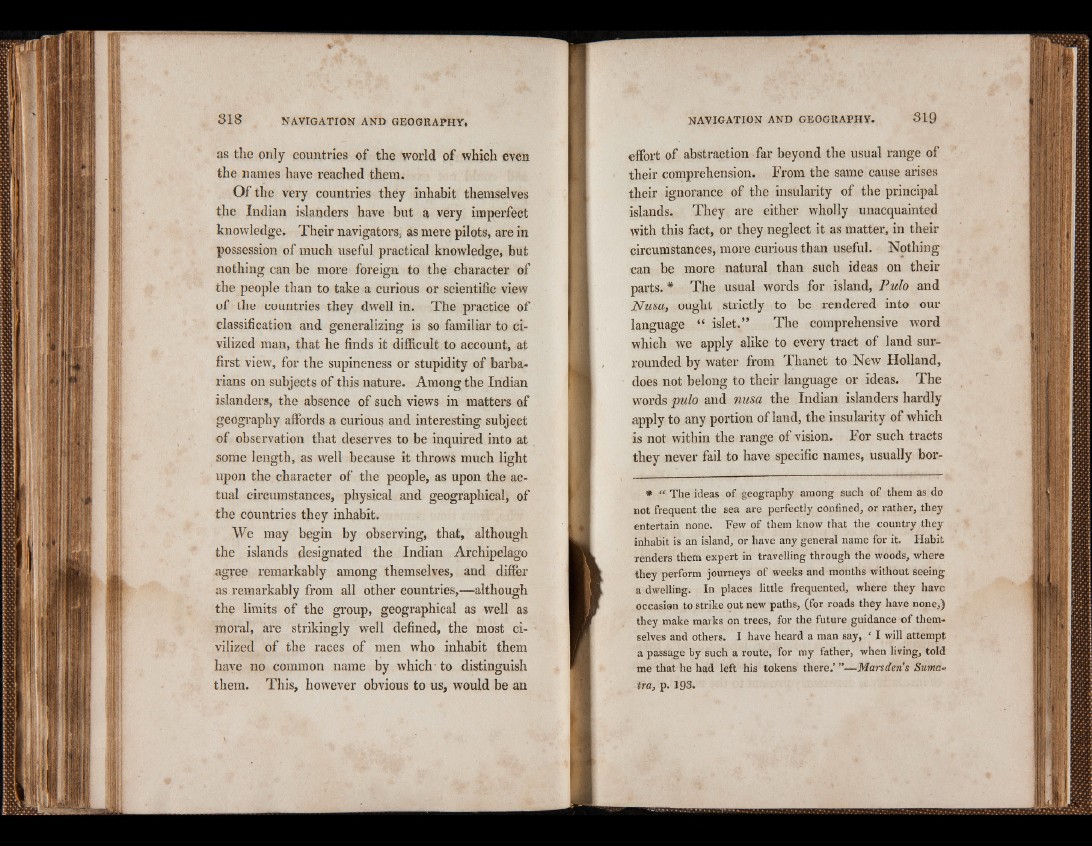
as the only countries of the world of which even
the names have reached them.
Of the very countries they inhabit themselves
the Indian islanders have but a very imperfect
knowledge. Their navigators, as mere pilots, are in
possession of much useful practical knowledge, but
nothing can be more foreign to the character of
the people than to take a curious or scientific view
of the countries they dwell in. The practice of
classification and generalizing is so familiar to civilized
man, that he finds it difficult to account, at
first view, for the supineness or stupidity of barbarians
on subjects of this nature. Among the Indian
islanders, the absence of such views in matters of
geography affords a curious and interesting subject
of observation that deserves to be inquired into at
some length, as well because it throws much light
upon the character of the people, as upon the actual
circumstances, physical and geographical, of
the countries they inhabit.
We may begin by observing, that, although
the islands designated the Indian Archipelago
agree remarkably among themselves, and differ
as remarkably from all other countries,—although
the limits of the group, geographical as well as
moral, are strikingly well defined, the most civilized
of the races of men who inhabit them
have no common name by which- to distinguish
them. This, however obvious to us, would be an
effort of abstraction far beyond the usual range of
their comprehension. From the same cause arises
their ignorance of the insularity of the principal
islands. They are either wholly unacquainted
with this fact, or they neglect it as matter, in their
circumstances, more curious than useful. Nothing
can be more natural than such ideas on their
parts. * The usual words for island, Pulo and
Nusa, ought strictly to be rendered into our
language “ islet.” The comprehensive word
which we apply alike to every tract of land surrounded
by water from Thanet to New Holland,
does not belong to their language or ideas. The
words pulo and nusa the Indian islanders hardly
apply to any portion of land, the insularity of which
is not within the range of vision. For such tracts
they never fail to have specific names, usually bor*
“ The ideas of geography among such of them as do
not frequent the sea are perfectly confined, or rather, they
entertain none. Few of them know that the country they
inhabit is an island, or have any general name for it. Habit
renders them expert in travelling through the woods, where
they perform journeys of weeks and months without seeing
a dwelling. In places little frequented, where they have
occasion to strike out new paths, (for roads they have none,)
they make marks on trees, for the future guidance o f themselves
and others. I have heard a man say, | I will attempt
a passage by such a route, for my father, when living, told
me that he had left his tokens there.’ ”—M a n den’s Suma«
tra, p. 193.